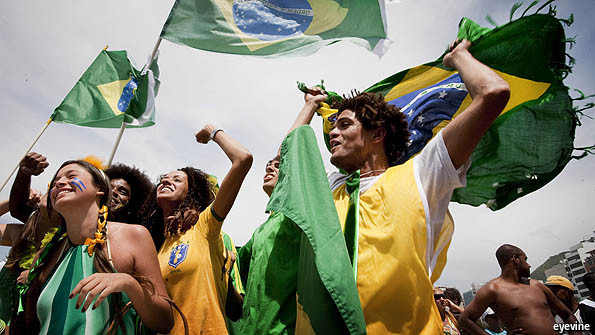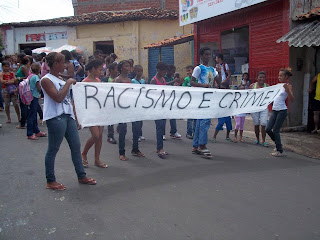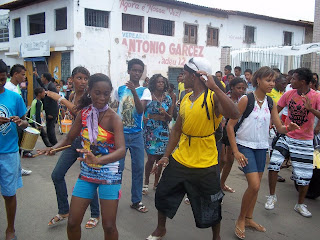New site aimed at Afro-Ethnic Tourism launched in Bahia, “An African nation in Brazil”
Aerial view of Salvador, Bahia, with an overview of Praia do Porto da Barra
Today, the results of that intense traffic of Africans can be witnessed in countless ways in this city that has become a major destination of tourists over the years. And while it’s great to see the interest of millions of tourists every year, the racial history and reality of the experience of African descendants cannot be simply glossed over with an eye-catching website. While Brazil was the last country to end slavery in 1888, the effects of this brutal regime can still be noted in the day of day of black baianos (Bahians) today. A sharp contrast to the image that legendary South African president Nelson Mandela had in mind on his visit in 1991. To fully take advantage of the vast interest in Bahia, a new website was recently launched to promote the unique attractions of Bahia in the “ethnic tourism” market. To expose the “other side” of this fantastical journey, José Raimundo dos Santos Silva exposes the realities of modern day racial politics in “An African Nation Called Bahia.”

Historic Pelourinho district in Salvador, Bahia
With the objective of “strengthening initiatives aimed at étnico-afro (Afro Ethnic) tourism and divulging the potential of the segment”, on Wednesday, December 18th, the Secretaria do Turismo do Estado da Bahia (Setur or Secretariat of Tourism of the State of Bahia) launched the Turismo Étnico-Afro da Bahia (Afro-Ethnic tourism of Bahia) site (
www.etnicoafro.bahia.com.br).
Pelourinho in Salvador, Bahia
During the ceremony, held at Forte da Capoeira in the Santo Antônio Além do Carmo neighborhood, according to a spokesperson of Sethur, there was a memorandum of understanding to promote sustainable tourism in the Baixo Sul region was also signed, which benefits the quilombola (maroon society) communities of Jatimane and Boitaraca.
Dique do Tororó in Salvador, Bahia
“We have taken an important step with the two initiatives that we launched today. We are the state pioneer in working the disclosure of the potential for afro-ethnic tourism, and the site will add to this divulgation. Already Baixo Sul, the tourist area of Pratigi promises the rise of structures and environmental safeguards, in order to later develop the lodging. This will also bring the strengthening of quilombolas in the region,” said Secretary of Tourism, Domingos Leonelli.
Capoeira in the Terreiro de Jesus in Salvador, Bahia
An African nation called Bahia?
During the period of the Western slave trade, Brazil was the country that most received African labor to work on its lands. The state that the quota was most concentrated in was Bahia. Starting in 18th century, the contingent of African descent was so great that the black influence in various sectors of “social life”, was felt by all who frequented this place. Therefore, Bahia was deemed the “New Guinea” of the New World.
View from Salvador, Bahia
by José Raimundo dos Santos Silva
This strong African presence made Bahia become the cradle of black culture in Brazil, and one of the principal regions of the world of the preservation and promotion of African culture. The cultural influence of black Bahia is so strong that almost all Afro-cultural manifestations of Brazil are sub-originated from there. For example, we have the samba, capoeira, Candomblé, etc. Bahia, in various aspects of its history and culture, had black people as its primary co-adjuvant.
Women of Candomblé
Even in the multiple uprisings that occurred there. Even today, Bahia is considered the “terra da negritude (land of blackness).” The place where music, art, dance, food, clothes, ornaments, speech, conception of time, and all that connects the way of being of its people, is influenced by the strong and striking black presence. The charm of the “terra da negritude” is so great that many Africans and African-diasporics go to Bahia to learn about black culture that doesn’t exist in Africa. Or, given the circumstances, hasn’t even been preserved in other parts of the African Diaspora.
Young women and girls from the Colégio Estadual Nossa Senhora de Fátima in Salvador, Bahia
Bahia, without a doubt, is one of the principal focuses of resistance and preservation of original worship and/or African tradition. Deserving, as such, from the bloco afro Ilê Aiyê in a past Carnival the name “nação africana (African nation)”. Thus, the clothes of Ilê Aiyê brought the following sentence: Uma Nação Africana Chamada Bahia (An African Nation Called Bahia). And it was reflecting upon this statement that emerged my desire to write this article. Well, it is indisputable the striking presence of black-African culture in Bahia of current times. Even today, Salvador, the capital of this state, is a city of absolute black majority. Having the highest populational concentration of black men and women outside of Africa estimated at 82% of afrodescendentes.
People in the Piedade region of Salvador, Bahia
Also Salvador, for its strong religious influence, was, and still is, considered the “Roma Negra (Black Rome)” or “Meca Negra Black Mecca” of the African Diaspora. It is considered the city of all rhythms and charms. However, all of this charm for the “land of blackness” is over when we replace the historical-cultural with a political-economic view. Looking from this critical approach, the political and economic conditions of blacks, we see that Bahia cannot be considered a “nação” (africana) (African nation)) in its broadest sense.
http://blackwomenofbrazil.co/2013/12...ion-in-brazil/
 Everyone knows what the American black movements have done for all people of colour around the world. Everyone knows about Malcolm X, Rose Parks, Martin Luther king Jnr, etc, and their contribution to civil rights for people of colour. Most people know about martin luthers speech and the significant events that lead to civil rights. Yet despite eclipsing the North American black population by about 70 million, i havemt heard much about South American blacks contribution to universal civil rights for poc. Was the situation better for blacks in Latin Americas, to the extent where they didnt need drastic revolutions unlike in Jim Crows America? Or perhaps their revolutionaries didnt recieve much attention from the world?
Everyone knows what the American black movements have done for all people of colour around the world. Everyone knows about Malcolm X, Rose Parks, Martin Luther king Jnr, etc, and their contribution to civil rights for people of colour. Most people know about martin luthers speech and the significant events that lead to civil rights. Yet despite eclipsing the North American black population by about 70 million, i havemt heard much about South American blacks contribution to universal civil rights for poc. Was the situation better for blacks in Latin Americas, to the extent where they didnt need drastic revolutions unlike in Jim Crows America? Or perhaps their revolutionaries didnt recieve much attention from the world? Everyone knows what the American black movements have done for all people of colour around the world. Everyone knows about Malcolm X, Rose Parks, Martin Luther king Jnr, etc, and their contribution to civil rights for people of colour. Most people know about martin luthers speech and the significant events that lead to civil rights. Yet despite eclipsing the North American black population by about 70 million, i havemt heard much about South American blacks contribution to universal civil rights for poc. Was the situation better for blacks in Latin Americas, to the extent where they didnt need drastic revolutions unlike in Jim Crows America? Or perhaps their revolutionaries didnt recieve much attention from the world?
Everyone knows what the American black movements have done for all people of colour around the world. Everyone knows about Malcolm X, Rose Parks, Martin Luther king Jnr, etc, and their contribution to civil rights for people of colour. Most people know about martin luthers speech and the significant events that lead to civil rights. Yet despite eclipsing the North American black population by about 70 million, i havemt heard much about South American blacks contribution to universal civil rights for poc. Was the situation better for blacks in Latin Americas, to the extent where they didnt need drastic revolutions unlike in Jim Crows America? Or perhaps their revolutionaries didnt recieve much attention from the world?




















